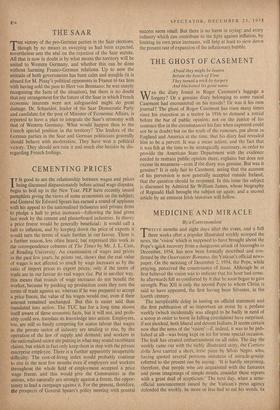CEMENTING PRICES
IT is good to see the relationship between wages and prices being.discussed dispassionately before actual wage disputes begin to boil up in the New Year. PEP have recently issued pamphlets giving the views of some economists on the subject; and General Sir Edward Spears has earned a round of applause with his appeal to the nationalised industries and private firms to pledge a halt to price increases—following the lead given last week by the cement and plasterboard industries. In theory a price freeze would be generally beneficial : it would call a halt to inflation, and by keeping down the price of exports it would turn the terms of trade further in our favour. There is a further reason, less often heard, but expressed this week in the correspondence columns of The Times by Mr. J. L. Carr, of Reading University. An examination of wages and prices in the past few years, he points out, shows that the real value of wages is not affected so much by wage increases as by the ratio of import prices to export prices; only if the terms of trade are in our favour do real wages rise. Put in another way, this means that rounds of wage increases do not benefit the worker, because by pushing up production costs they turn the terms of trade against us; whereas if lie was prepared to accept a price freeze, the value of his wages would rise, even if their amount remained unchanged. But this is easier said than translated into action. The TUC has for a long time shown itself aware of these economic facts, but it will not, and prob- ably could not, translate its knowledge into action. Employers, too, are still so busily competing for scarce labour that wages in the private sector of industry are tending to rise, by the operation of the law of supply and demand; and workers in the nationalised sector are putting in what may sound exorbitant claims, but which in fact only keep them in step with the private enterprise employee. There is a further apparently insuperable difficulty. The cost-of-living index would probably continue to rise in the next few months even if employers and workers throughout the whole field of employment accepted a price wage freeze, and this would give the Communists in the unions, who naturally are strongly against a freeze, the oppor- tunity to lead a campaign against it. For the present, therefore, the prospects of General Spears's policy meeting with general success seem small. But there is no harm in trying; and every industry'which can contribute to the fight against inflation, by limiting its own price increases, will help at least to slow down the present rate of expansion of the inflationary. bubble.


































 Previous page
Previous page